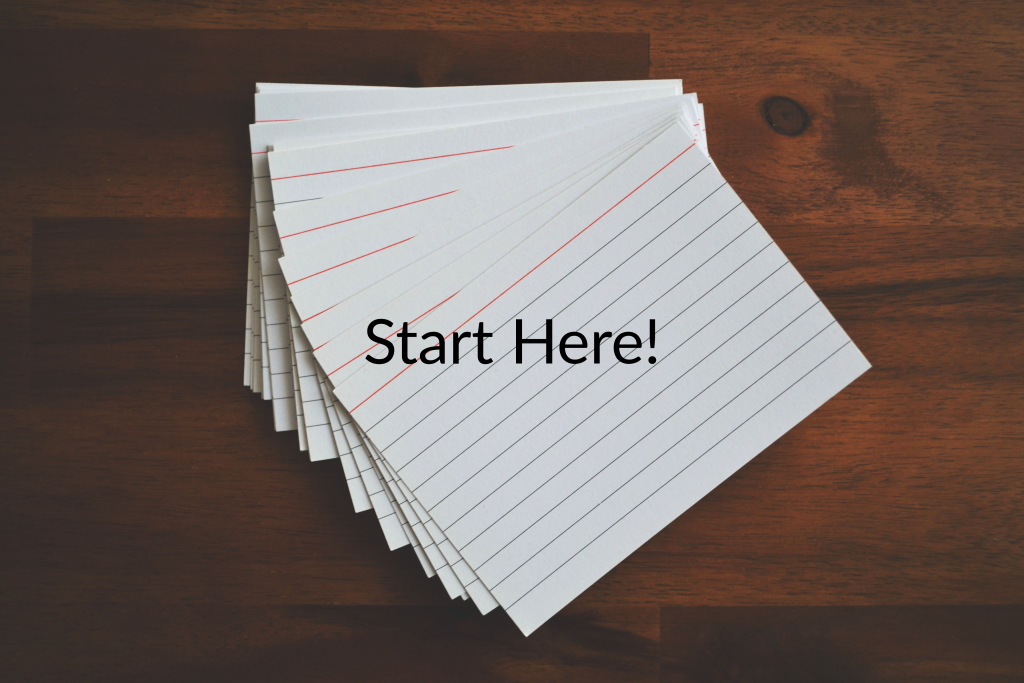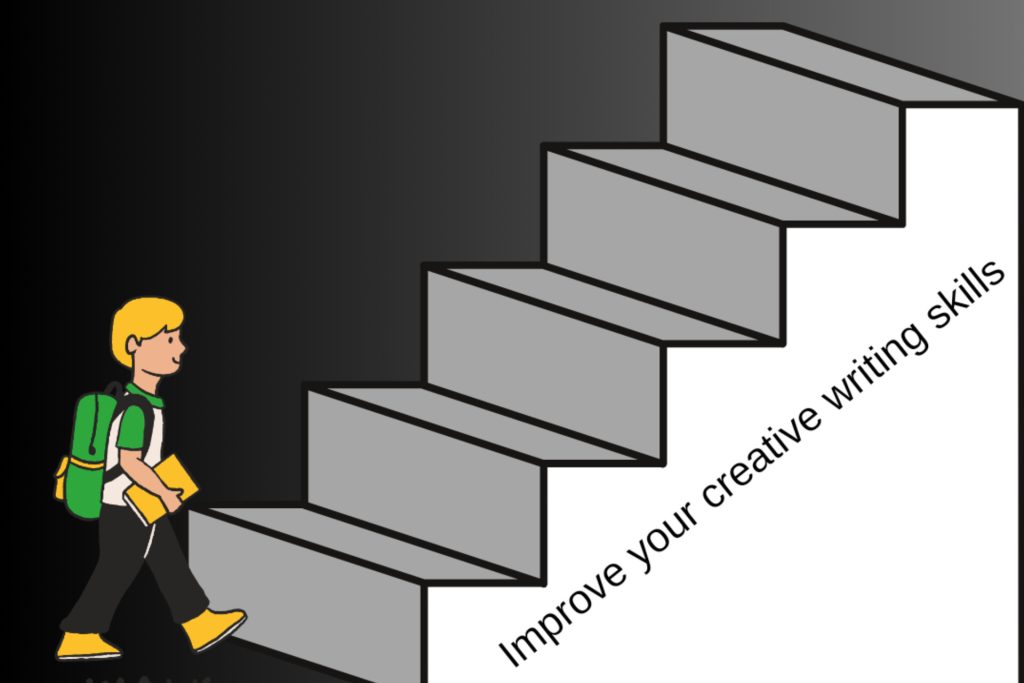Getting started in creative writing can be a fun and fulfilling experience. Yet, it can be a lonely and difficult journey if you think it requires just writing anything that comes to your head or testing out your imagination or even showcasing to the world that you’re an excellent writer through big and daunting grammar. Creative writing is much more. I wish I knew this when I started on October 25th 2018 (peep my first blog post here. *winks – it’s been a wild journey) but I’m glad I know better now. It is my desire that you don’t take the lonely and unsure path but the more knowledgeable path.
This is why this article would guide you on everything you need to know about creative writing; how to get started in creative writing, the different ways to improve your creative writing and the important writing skills you need as a creative writer.
What Is Creative Writing
It is important you know the definition of creative writing before getting started in creative writing.
In simple terms, Creative Writing is any content written with creativity at its forefront.
But this definition by Idreels Patel sums it all up.
“Creative writing is considered to be any writing, fiction, poetry, or non-fiction, that goes outside the bounds of normal professional, journalistic, academic, and technical forms of literature.”
But that is not all.
“Creative writing is any writing that is written to entertain and educate.”
Creative writing asks “How far can your mind go? Or how weird can you be in your imagination”
When your clothes get ruined by going to work on a rainy day for something trivial that would have simply been fixed by opening your PC at home, how do you tell that story in a way that is entertaining, innovative, and exciting so that it registers in the mind of the readers is what creative writing does.
Creative writing is written with creativity at its core. This is why I love creative writing, it has no set of rules like academia, essays, etc. It is not boxed up by old rules. It gives room for new ideas to get the message passed across.
Creative Writing is a way for people to express themselves in new and exciting ways.
Its purpose is to express oneself or a situation, whether feelings, thoughts, or emotions.
Types and Genre of Creative Writing
Free Writing
Just start writing in a notepad or on an electronic document. Allow unusual words and images to appear on the page. Play with your imagination and let your imagination fine expression with your words. Nothing is off-limits in Freewriting.
Fiction
The fiction genre includes all works conceived primarily out of the writer’s imagination. Subgenres under fiction are novels, short stories, or novellashttps://chikajonah.com/2018/10/25/old-path-new-path/.
Creative Non-Fiction
Writers of creative non-fiction develop stories based on true-to-life events but often infuse their personal views and experiences in their work. Subgenres under creative non-fiction are personal essays, book reviews, memoirs, interviews, autobiographies, biography, etc.
Poetry
Poetry includes writing meant to be heard out loud as well as read on the page. Although poetry can take many forms, its foundation is built on a balance of rhythm, imagery, metaphor, and other techniques used to communicate abstract ideas to readers. Subgenres under poetry are haikus, sonnets, free verse, prose poems, etc.
Drama
The genre of drama can include both the fictitious and the fact. In a drama, the story is primarily conveyed through dialogue between characters. Subgenres under drama are movie scripts, ten-minute plays, screenplays, written stage productions, etc.
Scripts
Write scripts for cinema, television, theatre, or video games to get your name on the big screen or the stage. Be aware that cinema is a medium for directors, not for writers, yet it can reach a non-reading audience.
Journal
Any written log is referred to as a journal. A gratitude notebook, a memory journal, a dream journal, or a goals journal are all options. Journaling can be a way to write a day in your life, daily intrusive thoughts, project plans, or brainstorming
Diaries
A diary is a sort of journal where you keep track of your everyday activities. Some diaries are formatted like letters (“Dear Diary…”). It’s a good idea to start maintaining a journal if you ever intend to write a memoir.
Letter Writing
Writing a letter is a vital skill since the capacity to communicate effectively is becoming increasingly valuable. Because letters have a long history of being published, be especially cautious while sending emails to friends, family, and business partners. Writing letters to the editor of a news outlet is one technique to be published if you don’t have a lot of clips and credits.
Memoirs
Memoirs are publications that feature personal narratives (or stories) that focus on individual events. They are a type of creative nonfiction. A journey memoir, for example, may be written.
Essays
Personal essays, descriptive essays, and argumentative essays are all examples of writings that may be extremely creative (and not especially academic).
Journalism
Some types of journalism are more innovative than others. Journalism used to be about objective reporting on facts, people, and events. To make their works more appealing or convincing, journalists nowadays frequently include opinion and narration in their writing.

How To Get Started In Creative Writing. 7 Ways To Getting Started In Creative Writing
Getting started in creative writing can be exciting and fulfilling. Here are a few steps you can take to begin your creative writing journey:
Start Reading:
To become a good writer, you need to read a lot. Start reading the works of authors whose style you enjoy. Pay attention to the structure of their stories, their character development, and their use of language.
Practice Writing:
Begin writing regularly. Write about anything that interests you, and don’t worry too much about quality at first. The more you write, the better you’ll become.
Find Your Voice:
As you write, you’ll begin to develop your unique voice. Embrace it, and don’t try to mimic someone else’s writing style. Stay unique to your voice.
Know your writing style:
Are you more descriptive in your writing in a way that shows more by giving a lot of details?
Are you very narrative, in a way that you tell more?
Are you expository in your writing in a way that you answer a lot of questions with facts?
Are you more persuasive in a way that you’re always trying to convince readers in your writing?
Answer these questions and figure out which writing style best suits you.
Join a Writing Group:
Consider joining a writing group (Our writing community with over 100 writers is open to all. Contact me here to indicate your interest) This will allow you to get feedback on your work and learn from other writers.
Experiment with Different Forms:
Try writing in different genres and styles. You might discover that you have a talent for poetry, short stories, or screenplays.
Edit and Revise:
Once you’ve written something, go back and revise it. Editing is an important part of the writing process and can help you improve the overall quality of your work.
Embrace Criticism:
Be open to feedback and criticism. It can be difficult to hear negative comments about your work, but it can also help you improve.

Creative Writing vs Content Writing
Most writers get confused about understanding both terms. This is why it would be incomplete if we were discussing getting started in creative writing without explaining in clear terms the difference between creative writing and content writing.
Creative writing is the form of writing that expresses the writer’s thoughts, emotions, ideas, and experiences in creative form. These writing forms can be poems, short stories, novels, and other types of creative write-ups.
On the other hand, content writing is writing for digital media such as news or business websites. These forms of content are blogs, social media content, web page content, services, and other SEO-friendly content.
What does Creative Writing entail?
Below are some components of creative writing
- It’s the artistic manner to express a writer’s thoughts engagingly.
- It is generally used for fiction and nonfiction texts.
- Creative writing also informs the audience.
- It presents a variety of points of view most straightforwardly and creatively.
- It’s the art of writing complex things in the simplest medium.
What does Content Writing entail?
Content writing is quite different from creative writing; let’s understand its components to get more depth information.
- It’s designed to write for a specific audience base.
- It requires following an efficient writing process to explain desired things.
- Content writing has a faster turnaround than creative writing.
- It should be engaging and also explain things in simple terms.
- Require a high degree of research and references.
10 Must Have Creative Writing Skills
1. Storytelling
The Boss of them all. This is what would make your writing shine through the darkness. Storytelling helps creative writers captivate and sustain the interests of their audiences with their writing. They can communicate information about a company or brand that’s easy for readers to understand. They may use figurative language, such as imagery and metaphors, to convey their messages.
2. Creativity
Creativity is an important skill for writers because it allows them to come up with new ideas and develop new stories. A creative writer can come up with unique characters, settings and plotlines that other writers might not think of. Additionally, creativity can help writers come up with different ways to say things and make their writing stand out.
3. Imagination
Imagination is so valuable in writing that even if I would sing its praises for days, they still wouldn’t help. Have trouble conjuring ideas? You need to have a bright imagination. You need to imagine… you need to ignore the naysayers. The well-known advice is to think outside the box. Just apply it. Let your imagination find expression in your words.
4. Research
Research inspires writers to understand a topic better. It also provides current and accurate information about their topics. It enables them to make their writing credible, and they can learn enough about the subject to explain it to the audience in interesting ways. Competent research skills are necessary for every writer.
5. Editing
After writing the content, professionals edit their work to identify and correct spelling and grammatical errors. They may also alter vocabulary and sentence structures to ensure the wording is easy for the audience to read and interpret. Being proficient in editing enables writers like yourself to be confident in the quality of their work and make sure it’s ready for readers to consume.
6. Blogging skills
This is the home of every writer. This is what would attract global kings to your doorstep and increase your visibility.
7. Time management
Time management can enable creative writers to meet expectations when they work on multiple projects at once. They can learn how to organize their workdays to accomplish every step of the writing process.
8. Digital marketing skills
Want to succeed in the digital world? This is the only way. This is your biggest positioning tool.
9. Content creation skills
This would help you communicate your work in the most possible way digitally. All those ideas you have would be shared easily with this.
10. Patience
Yes, patience is a skill that needs to be mastered by writers. I ain’t kidding. There’s no place for “get-rich-quick-seekers” in this world, and likewise, if you have a mentality for “get-success-quick” it won’t work. Shove it out the window. Period. One has to be patient in writing, goes without saying.
Now that you know these skills, how can you improve and refine them to assist you to keep writing better? By following the next tips I’m going to share.

Improve Your Creative Writing Skills With These 10 Tips
1. Start Writing Regularly
It doesn’t matter whether you write once a day or a week or a month, or anything else, your writing should not be scheduled in which you can’t match your other work.
“Write Everyday” is such outdated advice.
A better one is “Write regularly as much as you can inside your genre.”
~ Grab my free 250 Writing Prompts to help you write regularly
2. Read, read, read
One of the best ways to improve your writing is to read as much as you can. By reading widely, you expose yourself to different styles of writing and different ways of structuring stories and arguments. The more you read, the more you’ll develop an understanding of what makes good writing and what doesn’t.
3. Edit!
No writer is perfect or above grammatical errors. But common grammatical errors should be avoided at all costs by editing your work over and over again.
Don’t rely on your computer’s spell checker. If you make a typo, the computer will not warn you if you’ve still spelt a valid word. Edit your work properly!
4. Give Your Characters Life
Characters are vital to your story so treat them with care and give them that breath of life that you, the writer, have the power to give. Give them unique characteristics; make them believable by making them have a purpose, motivation and conflicts to resolve.
5. Use Strong Words
You want your writing to sound decisive, so use words that get the point across. Did Bola’s really big headache cause him a lot of pain or did Bola’s migraine cause excruciating pain? But remember not to overdo it: don’t use words that the reader won’t understand, you want to use strong words, not confusing or extravagant ones.
6. Show Don’t Tell.
Who hasn’t heard that one before? But it’s a valid point and a useful rule for all writers. Fiction is for entertainment, so entertain your reader! Give them an excuse to escape into the reality that you have created. Let them see, hear, feel, smell, laugh, cry, love and hate. Show your reader the world that you’ve created, don’t just tell them about it.
7. Check your Commas
While commas can be effective many inexperienced writers tend to sprinkle their sentences with them. When placed incorrectly, commas can chop up your sentences and sometimes even alter the meaning. Brush up on your high-school grammar; your work will improve with that alone.
8. Grab their Attention from the Start
Opening lines are often referred to as ‘the hook’ because that’s exactly what you want them to be. You get the reader’s attention and reel them in for the rest of the story. Try something powerful to kick-start your story. For example: ‘Why I left how and never came back at 10 years old’ or ‘Meeting the blind girl who could read’ or ‘The bullet that pierced Henry’s back and left him paralyzed was meant for a homeless man’. Each of these lines makes the reader ask ‘Why?’ and once they ask that question, the reader will keep on reading until they find the answer.
9. Give Your Reader a Satisfactory Ending
You can leave the reader speculating or wondering why at the end of your story but try to resolve as much as you can. If your reader finishes the last sentence and is still asking questions about what happened to who and why, then you still need to tie up the loose ends.
10. Take a class
Taking a creative writing class is a great way to improve your writing skills. You’ll get feedback from your instructor and your classmates, and you’ll be able to practice your writing in a structured setting. The “Write Like A Pro” workshop is the best training for you. It would equip you with transformative skills to become a professional writer and start a high-paying career. This will allow you to get feedback on your work, become a pro writer, learn from the best, and position yourself for growth.
Register for any of my classes here
Remember, the most important thing is to start writing! These tips and guides would be useless if you don’t start. Don’t worry about making your writing perfect; the important thing is to get your ideas down on paper and let your creativity flow. That my friend, is the beauty of creativity. Happy writing!
Did you find this content useful? Share in the comment and don’t hesitate to drop your questions & concerns



